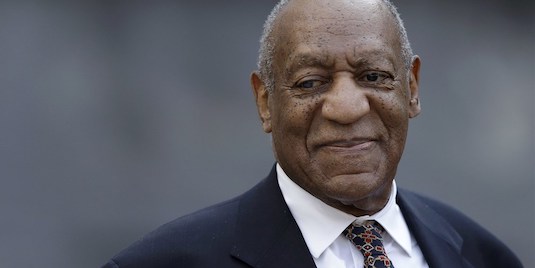WorldNetDaily’s columnists have a soft spot for Bill Cosby, even after allegations of sexual assault surfaced — for example, Jesse Lee Peterson insisted the charges were part of a liberal conspiracy against him.
Now that Cosby has actually been convicted on a sexual assault charge, WND columnists are still trying to defend him. Carl Jackson took a Peterson-esque conspiracy route, claiming Cosby was targeted because he made speeches critical of the black community and lamenting that nondisclosure agreements are coming back to bite him:
Initially, they were hard to believe, hard to fathom, but as witnesses came forward in larger numbers, the accusations became impossible to dismiss. Having said all of that, Bill Cosby’s conviction at his retrial would not have been possible if two things hadn’t occurred:
- If the New York Times had not obtained and released Cosby’s deposition transcript from his 2005 testimony regarding Andrea Constand’s civil suit against him. Ultimately, Constand was rewarded $3.4 million after signing a confidentiality agreement that banned both parties from releasing the documents. Apparently, the transcript itself was never sealed despite the agreement.
- Secondly, Cosby’s conviction in the retrial wouldn’t have been possible if Judge O’Neill, who presided over the first trial that resulted in a hung jury, hadn’t allowed testimony of five accusers with unfounded claims to tip the scale in favor of the prosecution. According to the New York Post, criminal defense attorney Stuart Slotnick, who has followed the trial for two years, believes there are “strong grounds for appeal,” since it was clear the prosecution couldn’t convict Cosby based on Andrea Constand’s testimony alone. In addition to her testimony, Montgomery County District Attorney Kevin Steele used testimony from other accusers – who, again, offered no proof or evidence – to establish a pattern of behavior from Cosby. This could be problematic for the prosecution because Bill Cosby was never charged in any case regarding the accusers that testified against him. Judge O’Neill never explained why he allowed their testimony.
In a court of law, it shouldn’t matter what you think about Cosby; what should matter is what you can prove. Like it or not, that’s our system. Furthermore, let’s be honest, had Cosby not began advocating for family values in the black community, none of this would’ve ever been exposed. In the end, it isn’t my goal to defend Cosby’s despicable acts, if his accusers are telling the whole truth. If they are being totally truthful, Cosby has no one to blame but himself for his legal problems. However, it’s clear to me that nondisclosure agreements mean nothing in the era of the #MeToo movement, and unproven testimony from witnesses is enough to put you away for life. The latter especially should disturb us all.
Barry Farber, meanwihle, wants President Trump to pardon Cosby and insrtead be sentenced to provide uplifting messages to people:
Why not admit it? I want President Trump to pardon Bill Cosby.
And, yes, I’m aware of all the rapacious evil I’m abetting and the glorious victory over those forces I’m seeking to annul. And I still want Trump to pardon Cosby.
[…]Bill Cosby’s entire life up to these criminal adventures with women is one huge mitigating circumstance. Bill Cosby’s contribution to the betterment of America is unique. Please don’t tumble into that common error of calling somebody or something “rather unique” or “kind of unique.” “Unique” is an absolute, and calling Cosby unique means there’s no one like him, past or present. Cosby mobilized the healing power of television to deflect rising tension between the two major races, and his life and work gave rise, oddly enough, to good solid moral messages whose penetrating power dwarfs those of any sermon in any church, synagogue or ashram.
Bill Cosby’s uniqueness in his contribution to us calls for unique treatment from us. But should we therefore annul his conviction and apologize to him? Certainly not!
In return for no jail time, Cosby will agree to speaking engagements before appropriate audiences of young people. He will reach those audiences with a strong message on building a life that’s praiseworthy and stays praiseworthy lest it all come crashing down on them as it did on him!
Farber doesn’t seem to understand that Cosby’s “praiseworthy” public life was revealed as a sham through his private behavior, making any uplifting message he might offer now moot and hypocritical.
